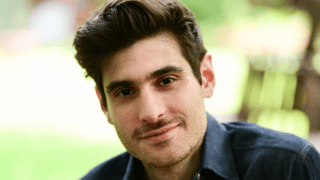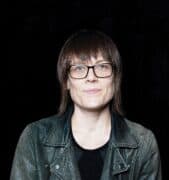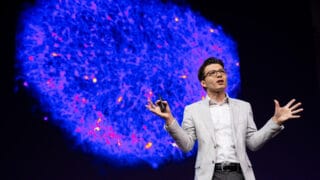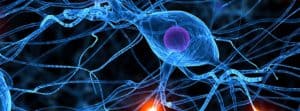The Lavin Agency Speakers Bureau
A speakers bureau that represents the best original thinkers,
writers, and doers for speaking engagements.
A speakers bureau that represents the best original thinkers,
writers, and doers for speaking engagements.
You are your brain, but you can also shape it—and become more creative, more productive, and the best version of yourself.
Does different music make you more productive? What’s the best way to spark creativity at work? You are your brain, says Dr. Heather Berlin, but you can also affect the way it works—and make better decisions, develop your innovation, and make your whole company more productive. A cognitive neuroscientist and host of PBS Nova’s Your Brain, Heather has spent her career exploring how we can make the most of our brains—and the brains of the people we lead. “The more we understand about how the brain works,” she says, “the more leaders can understand how to structure their environment to get the most out of their company.” In talks, she shows you how to amp up your creativity (and why the worst thing you can do is sit down and try to be creative), how to develop empathy for people who think differently from you, what your brain can do better than ChatGPT (and what it can’t), and much more.
You are your brain. But how exactly do your thoughts, feelings, perceptions and sense of identity derive from this three-pound organ locked inside the black box of your skull? In her provocative talks, Dr. Heather Berlin takes audiences on a journey deep into the brain, the mind, and the self, as she reveals the startling and exciting recent findings of cutting-edge neuroscience. How does your brain accomplish spontaneous creativity? How much self-control or “free will” do we really have? And what does the future hold, once brains begin to interact with cognitive implants and “neural prosthetics”? Berlin will introduce you to your dynamic unconscious mind, a bigger part of “who you are” than you could ever guess.
In her PBS Nova show Your Brain, Berlin explores our biggest questions about our brains: why people see colors differently, how much of our decisions we actually control, and whether what we see is actually real. The two-part series touches on her lifelong quest to understand consciousness and what makes us human. In talks, she explains how neuroscience affects our everyday lives, and how understanding the workings of our brains can help us become the best, most creative, most productive versions of ourselves.
Committed to integrating the arts and sciences, science communication, and promoting women in STEM, Berlin is a founding committee member of the National Academy of Sciences’ “Science and Entertainment Exchange” Program, and a member of the American Association for the Advancement of Science’s Committee on Science and Technology Engagement with the Public. She co-hosted StarTalk All-Stars with Neil deGrasse Tyson and has hosted series on PBS and Discovery Channel. She has made numerous media appearances including on the BBC, History Channel, Netflix, National Geographic, NPR, and TEDx, and was featured in the documentary film Bill Nye: Science Guy. Berlin is an associate clinical professor of psychiatry and neuroscience at the Icahn School of Medicine at Mount Sinai and trained in clinical neuropsychology at Weill Cornell Medicine in the Department of Neurological Surgery. She received her Ph.D. from the University of Oxford and Master of Public Health from Harvard University.

Author, A Brief History of Intelligence AI Entrepreneur and Founder of Bluecore Forbes 30 Under 30 Honoree

First Deputy National Cyber Director for Technology and Ecosystem Security Former White House AI Council Member Former Google Global Head of Product Security Strategy

WIRED Global Editorial Director

Author, A Brief History of Intelligence AI Entrepreneur and Founder of Bluecore Forbes 30 Under 30 Honoree

New York Times Visionary in Medicine and Science Founding Director of Stanford Brain Organogenesis Knight of the Order of Merit
Author of The End of Bias Award-winning science and culture journalist

Author, A Brief History of Intelligence AI Entrepreneur and Founder of Bluecore Forbes 30 Under 30 Honoree

First Deputy National Cyber Director for Technology and Ecosystem Security Former White House AI Council Member Former Google Global Head of Product Security Strategy

WIRED Global Editorial Director

Author of Grit, the #1 New York Times Bestseller | Pioneering Researcher on Grit, Perseverance, and the Science of Success

2024 Nobel Prize Winner | 3rd Most Cited Economist in the World | MIT Institute Professor | Bestselling Co-Author of Why Nations Fail and Power and Progress

Pulitzer Prize-Winning Creator of The 1619 Project | Executive Producer of the Emmy Award-Winning 1619 Project Hulu Docuseries | MacArthur Genius
Nike's Former Chief Marketing Officer | Author of Emotion by Design
CEO of The Atlantic | Former Editor-in-Chief of WIRED

The unconscious mind and brain is more powerful and active than we ever imagined, says Dr. Heather Berlin. Knowing that, how can we optimize ourselves for success, i.e. hack our own cognitive systems? Berlin studies the seemingly mysterious topics of creativity, consciousness, and willpower, helping us to better understand ourselves and others, including what they want and how to help them.
This fascinating talk unlocks the secrets of attention, perception, and human wellbeing, and shows how these human traits are key to the future digital economy. Businesses with a clear view of how they work will have an edge on competitors, and leaders who know how to boost creativity in their employees will see massive success. We can all make better decisions and get the most out of our brains, Berlin says—but we need to understand them first.

Is ChatGPT really conscious? Is creativity a purely human trait? What can Artificial Intelligence do better than us—and where will the human brain continue to outshine it? No one is better equipped to answer these questions than Dr. Heather Berlin, cognitive neuroscientist and host of PBS Nova’s Your Brain, who has dedicated her career to understanding the big issues of humanity and consciousness that ChatGPT is calling into question.
In this brilliant talk, Berlin draws on her expertise with the brain to show us what human consciousness looks like, and explains how, although Artificial Intelligence as we know it isn’t conscious, artificial brains are already in the works. As AI-generated content continues to flood the internet, she argues that we will need human connection more than ever before, and asks us to consider what it looks like to build community in a world of technology. Audiences will walk away with a better understanding of what AI can and can’t do, and inspired to fight for a world where the human element isn’t erased but rather enhanced by AI.